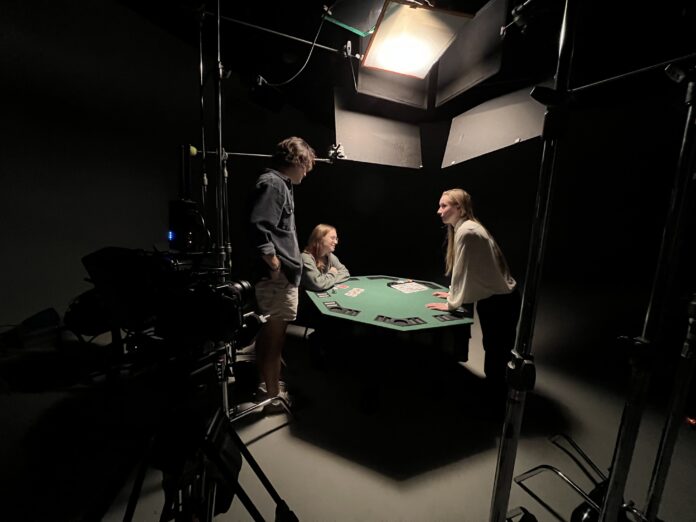
By Julianne Fullerton | Reporter
In film and digital media classes like production methods II (PMII) and short film production, students are exposed to the process of making short films, preparing them for their careers at Baylor and beyond.
Maverick Moore, senior lecturer in film and digital media, said in PMII, he tries to replicate the advice of director Stanley Kubrick, who once said “the best education in film is to make one.”
“I just want them to make something and learn from the things that go right for them and learn from their mistakes,” Moore said. “That’s the intention of the class, is to do a little bit of everything. You discover what your strengths are, what your weaknesses are, what you like and what you don’t like. That not only helps inform what you want to do and where and how you should grow, but also what classes you should take after PMII.”
When teaching upper-level classes such as short film production, Moore said the expectations are much higher. He said he holds students to the standards of what film festivals would expect before ushering them into the world of film post-grad.
“The upper classes is what familiarizes them with the expectations,” Moore said. “That’s why I always encourage — if you’re interested in making films — continue taking classes beyond PMII, because that’s where you really learn what is expected of you and what the standards are.”
As a filmmaker who has experience being a film festival programmer, working on awards juries and being on screening committees, Moore said he is familiar with the film festival world and what short films need to be like to succeed.
“It allows me to inform the students what I am witnessing so that they can avoid those same kinds of mistakes,” Moore said. “I just want the students to learn from my experience as well, so they can grow in their own way.”
After taking PMII with Moore, Nashville, Tenn., sophomore Joe Hauk said he felt prepared to go out and make a short film on his own.
“He really prepared us,” Hauk said. “He kind of took us through every single step of the process. I felt completely prepared; there wasn’t a point where I felt like I was struggling to keep up.”
Hauk had two short films selected for the Black Glasses Film Festival last week. The short film he made for PMII was entitled “More Important Things.” Hauk said he based it on himself, as he has ADHD but doesn’t take medication for it.
“I wanted to make a film kind of describing the benefits of ADHD because I feel like no one ever talks about that, because I could probably ascribe a lot of my artistic ability to my ADHD,” Hauk said. “I wanted to make a film about a character who was confused, who came to a doctor wanting meds for ADHD, and then as he sits through the appointment, he starts realizing that it’s actually something he doesn’t want. So, in the end, he throws away the prescription for it.”
Hauk said it’s the parts of the short film that no one will ever notice that he is most proud of.
“The bits and pieces that no one notices because they’re not supposed to — those are the parts that I hold dear to my heart, because no one comes to me and says, ‘Oh, you made a mistake there,’” Hauk said. “I know that I did it well.”
Another one of Hauk’s short films that was selected for the festival was entitled “Dots.” Hauk said he made it this semester for his short film production class, which required one unbroken shot.
“It was a project for this semester where … the camera was not allowed to move at all,” Hauk said. “Basically, the frame is a painting that two girls are looking at, so they’re looking into the camera the entire time, and they’re discussing whether or not they think it’s art.”
For students working on their first short film, Moore said he encourages them “just to make it.”
“You have to get over the fear and intimidation, even pressure of making something, and especially feeling like it has to be perfect, because it is your first film,” Moore said. “You’re inevitably going to make mistakes. I think what you need to take from that is what you learned and know that you can use what you learned and approach it better the next time.”





